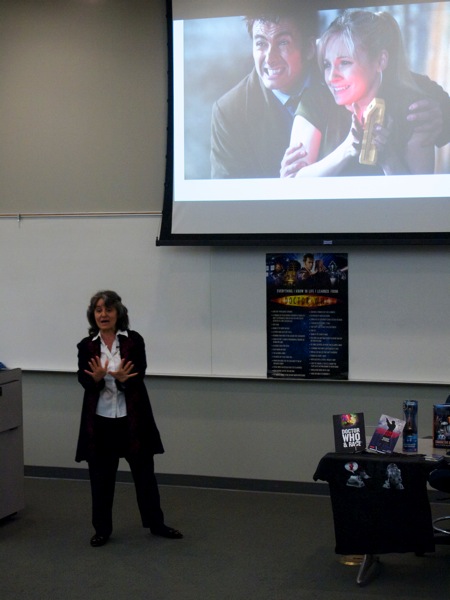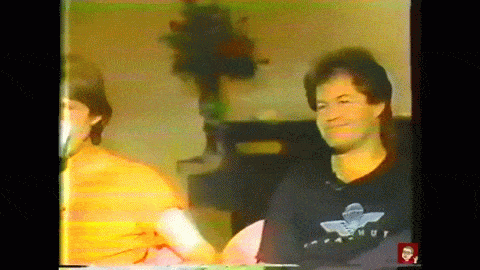Dr. Rosanne Welch presents “How Doctor Who Redefined Masculinity: A Study of the Doctors and their Male Companions“ at the Cal Poly Pomona University Library. Dr. Welch teaches in the IGE (Interdisciplinary General Education) program.
Watch the entire presentation here
Transcript:
I didn’t pick, because I’m not going to pick for you. You’ve got to pick for yourself. These are the messages that we’re being sent by this piece o popular culture. So, how we’re relating to those messages is the question. What I did do was look into who the show named as the most manly man and they did in The Day of the Doctor. They made a choice. They mentioned the man that all men should live up to. Anyone remember who it was? It’s at the very end of The Day of the Doctor. And it’s John Hurt talking. He’s made that choice, right, in the end. Made the cool choice not to bow everybody up. I thought that was brilliant writing. Who knew you could do that? Literally, re-wrote the last 10 years of the series with that one choice. Who did he pick as the manliest man ever to appear on Doctor Who? A Woman! A modern women is the equal to any man. That’s a modern an talking. That’s a modern man thinking about people as complete and total equals and, to me, that was so cool when I stumbled on that. Didn’t even occur to me. Now, Clara’s not necessarily my favorite character, but in this particular episode she helped a decision be made that saved the world. She’s the one who told him he didn’t have to drop the bomb. That’s a huge, manly, choice. She influenced the lives of millions by standing up and saying that. So, I think that was hilarious and wonderful which brings us back to that first quote. “Waste no more time arguing about what a good man should be. Be one.” Right now! Today! Which means be a good family man. There you have it. Thank you so much for coming.
A clip from this 5th talk on various aspects of Doctor Who presented by Dr. Welch. You can find Dr. Welch’s other Doctor Who talks using the links below.
- Feminism in the Whoniverse
- Doctor Who and Culture
- Doctor Who Regenerated
- “How the Growing Popularity of the English Who-niverse Effected American TV” with Dr. Rosanne Welch

Follow Dr. Rosanne Welch on the Web and via social media at:
- Dr. Rosanne Welch Web Site and Blog
- Subcribe to Dr. Rosanne Welch on YouTube
- Follow Dr. Rosanne Welch on Twitter
- Dr. Rosanne Welch on Pinterest
- Dr. Rosanne Welch on Tumblr
Podcast: Play in new window | Download
Subscribe: RSS
![Who is the Manliest Companion on Doctor Who? from How Doctor Who Redefined Masculinity [Video] (2:13)](https://rosannewelch.com/wp-content/uploads/2016/04/dw-masculinity-24-manliest-companion-anim.gif)

![Who is the Manliest Man on Doctor Who? from How Doctor Who Redefined Masculinity [Video] (1:30)](https://rosannewelch.com/wp-content/uploads/2016/04/dw-masculinity-23-manliest-man-anim-1.gif)
![Brigadier Lethbridge-Stewart as Father Figure 2 from How Doctor Who Redefined Masculinity [Video] (1:35)](https://rosannewelch.com/wp-content/uploads/2016/04/dw-masculinity-22-brigadier-2-anim.gif)

![Brigadier Lethbridge-Stewart as Father Figure from How Doctor Who Redefined Masculinity [Video] (1:07)](https://rosannewelch.com/wp-content/uploads/2016/04/dw-masculinity-21-brigadier-anim.gif)

![Danny Pink and Fatherhood Part 2 from How Doctor Who Redefined Masculinity [Video Clip] (1:10)](https://rosannewelch.com/wp-content/uploads/2016/03/dw-masculinity-20-danny-pink-father-2-anim.gif)


![Danny Pink and Fatherhood from How Doctor Who Redefined Masculinity [Video Clip] (0:49)](https://rosannewelch.com/wp-content/uploads/2016/03/dw-masculinity-19-danny-pink-father-anim.gif)